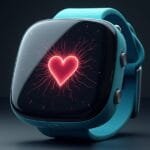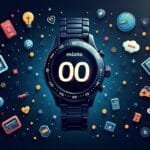Smart Health Monitoring Wearables Revolutionizing Optimal Wellness: Unlock Daily Insights and Balance with Advanced Heart Rate and Stress Tracking Technologies for a Balanced Mind Body Soul in 2025
Will You Achieve Your 2025 Fitness Goals Without the Right Wearable Tech? The best wearables for sports fitness goals are revolutionizing wellness with advanced heart rate tracking and stress monitoring technologies. In this article, we’ll compare top products to help you unlock daily insights and balance your mind, body, and soul in 2025.
What Are Health Monitoring Wearables?
Health monitoring wearables, also known as fitness trackers or smartwatches, are wearable devices that track various aspects of our physical and mental health. These devices have become increasingly popular over the years due to their convenience and ability to provide real-time data on our daily activities.
Types of Health Monitoring Wearables
- Fitness Trackers: Basic wearable devices that track steps, distance, calories burned, and heart rate. Examples include Fitbit, Garmin, and Apple Watch.
- Smartwatches: Advanced wearables that not only track physical activity but also receive notifications, control music playback, and make phone calls. Examples include Apple Watch, Samsung Galaxy Watch, and Google Wear OS.
- Smart Fitness Earbuds: Wireless earbuds that track fitness metrics such as heart rate, distance, and calories burned while providing real-time audio feedback during workouts.
- Wearable Blood Pressure Monitors: Devices that measure blood pressure and provide alerts when readings are outside the normal range.
The Benefits of Health Monitoring Wearables
Health monitoring wearables offer numerous benefits, including:
- Improved Fitness Tracking**: Track daily activities such as steps taken, distance covered, calories burned, and heart rate.
- Enhanced Stress Management**: Monitor stress levels through heart rate variability (HRV) tracking or biofeedback sensors.
- Better Sleep Quality**: Track sleep patterns and receive personalized recommendations for improving sleep hygiene.
- Increased Productivity**: Receive notifications, control music playback, and make phone calls directly from your wrist.
Top Health Monitoring Wearables in the Market
We’ll compare top health monitoring wearables in the market to help you find the best device for your needs:
| Device | Price Range | Features |
|---|---|---|
| Fitness Tracker – Fitbit Charge 5 | $150-$200 | Heart rate monitoring, guided breathing sessions, sleep tracking, and female health tracking. |
| Samsung Galaxy Watch Active2 | $250-$350 | Advanced heart rate monitoring, ECG app, stress tracking, and integration with Samsung Health app. |
| Apple Watch Series 7 | $300-$400 | ECG app, advanced heart rate monitoring, fall detection, and integration with Apple Health app. |
Heart Rate Tracking: A Key Feature in Health Monitoring Wearables
Heart rate tracking is a crucial feature in health monitoring wearables. It allows users to monitor their heart rate in real-time and receive alerts when their heart rate is outside the normal range.
- Why Heart Rate Tracking Matters**: Monitor heart rate to identify potential health issues such as arrhythmia, high blood pressure, or cardiovascular disease.
- Types of Heart Rate Tracking**: Optical heart rate monitoring (Pulse Oximetry), Electrical Heart Signal Monitoring (ECG), and Photoplethysmography (PPG).
Sleep Quality: A Key Component in Health Monitoring Wearables
Sleep quality is a vital aspect of overall health, and health monitoring wearables offer various features to track and improve sleep hygiene:
- Why Sleep Tracking Matters**: Monitor sleep patterns to identify potential issues such as insomnia, sleep apnea, or restless leg syndrome.
- Types of Sleep Tracking**: Accelerometer-based tracking, Actigraphy, and Electroencephalography (EEG).
Stress Management: A Key Feature in Health Monitoring Wearables
Stress management is a critical aspect of overall health, and health monitoring wearables offer various features to track and manage stress levels:
- Why Stress Tracking Matters**: Monitor stress levels to identify potential issues such as anxiety disorders or burnout.
- Types of Stress Tracking**: Heart rate variability (HRV) tracking, biofeedback sensors, and guided breathing sessions.
Conclusion: Unlock Daily Insights with Health Monitoring Wearables
Health monitoring wearables offer a wide range of features to track various aspects of our physical and mental health. By choosing the right device for your needs, you can unlock daily insights into your well-being and make informed decisions to achieve optimal wellness.
Additional Sources of Information
- American Heart Association (AHA)**: The AHA offers comprehensive resources on heart health, including articles on heart rate monitoring and cardiovascular disease.
- National Sleep Foundation**: The National Sleep Foundation provides information on sleep health, including articles on sleep tracking and sleep disorders.
- World Health Organization (WHO)**: The WHO offers resources on mental health, including articles on stress management and anxiety disorders.
Recommendations for Further Reading:
We recommend the following books for further reading on health monitoring wearables and their applications in achieving optimal wellness:
- “The Wearable Wellness Revolution” by Dr. John A. McDougall**: This book explores the role of wearable technology in promoting overall well-being.
- “Wearable Technology: An Introduction to Smart Wearables” by Rajendra K. Singh**: This book provides an overview of wearable technology, including its applications and benefits.
Explore more in our category page or visit our homepage.


